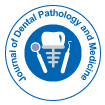Host-Modulation Therapy in Dentistry: An In-depth Overview
Received Date: Oct 01, 2024 / Accepted Date: Oct 29, 2024 / Published Date: Oct 29, 2024
Abstract
Host-modulation therapy (HMT) in dental medicine refers to a therapeutic approach that targets the host’s immune response, rather than directly targeting the microbial agents causing diseases. This treatment modality has garnered increasing attention in the management of periodontal diseases, including gingivitis and periodontitis, as it can modify the host’s inflammatory response to microbial challenge. HMT aims to alter the balance of hostderived inflammatory mediators, thereby reducing tissue destruction and promoting periodontal healing without the use of antibiotics or antimicrobial agents. Periodontal diseases are often driven by a deregulated immune response to bacterial biofilm accumulation, leading to chronic inflammation, tissue degradation, and eventual tooth loss. While conventional therapies such as scaling and root planing focus on mechanically removing bacterial biofilms, host-modulation therapy seeks to control the destructive inflammatory processes through pharmacological or non-pharmacological interventions. Various agents, including non-steroidal anti-inflammatory drugs (NSAIDs), bisphosphonates, statins, and low-dose doxycycline, have been studied for their ability to modulate inflammatory pathways, such as matrix metalloproteinases (MMPs) and cytokine activity. The potential advantages of host-modulation therapy include reduced reliance on antibiotics, the ability to target specific aspects of the inflammatory response, and the promotion of tissue regeneration. However, its use remains controversial, with concerns about long-term safety, side effects, and the need for further evidence to guide its widespread clinical adoption. This abstract reviews the current state of host-modulation therapy in periodontal treatment, examining both its mechanisms of action and the clinical outcomes of its application. The future of HMT holds promise, with ongoing research focused on enhancing its efficacy and understanding the precise roles of host factors in periodontal disease progression.
Citation: Lily J (2024) Host-Modulation Therapy in Dentistry: An In-depth Overview. J Dent Pathol Med 8: 240. Doi: 10.4172/jdpm.1000240
Copyright: © 2024 Lily J. This is an open-access article distributed under the terms of the Creative Commons Attribution License, which permits unrestricted use, distribution, and reproduction in any medium, provided the original author and source are credited.
Share This Article
Recommended Journals
黑料网 Journals
Article Tools
Article Usage
- Total views: 52
- [From(publication date): 0-0 - Feb 04, 2025]
- Breakdown by view type
- HTML page views: 33
- PDF downloads: 19
